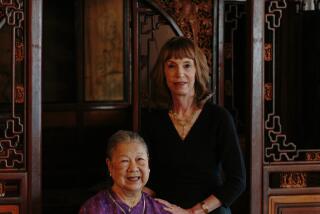Women share a lifeline in a China of tortured beauty
- Share via
The women of 19th century China whom Lisa See writes about in her tenderhearted new novel were a brutally oppressed class. They were the reproductive oxen of a culture that was ruled by men for men, a culture that insisted upon absolute obedience and lots and lots of baby boys from “bed business.”
Women were partitioned, forced to dwell in women’s chambers with their mothers, aunts and sisters. They endured the abject pain and humiliation of foot binding, in effect undergoing primitive reconstructive surgery to appeal to potential suitors. Every impulse toward self-actualization was tamped down; identity was subsumed within the family unit and then buried within the ceremonial folds of the arranged marriage.
All of this is well-trod history, a rich seam that has been excavated by many novelists both here and in Asia. What See brings to the story is a historical secret, something, as she explains in the afterword to this book, that she herself learned from Wang Ping’s book on the history of foot-binding in China, “Aching for Beauty.” It’s nu shu, a written language that was invented in order for women to freely communicate among themselves without fear or restraint. It was a gender-specific lexicon; men couldn’t write or read it and therefore couldn’t suppress it.
Nu shu becomes a lifeline between the two protagonists in See’s novel: Lily, the daughter of an uneducated, neglectful farmer and an overbearing matriarch, is now the 80-year-old spinster who narrates this story, and Snow Flower is a girl from the upscale village of Tongkou who has delusions of hauteur. The two girls, who are separated by thousands of miles and vastly different cultural assumptions, are brought together by a diviner, a kind of matchmaker who sees in Snow Flower and Lily the possibility of a laotong, a rare conjoining of two kindred souls that lasts a lifetime.
This laotong is put to the test in myriad ways as See’s story unfolds, changing like the Chinese characters on the shared fan that Snow Flower and Lily decorate with their delicate calligraphy and exchange back and forth across the passing years. Bound by obdurate tradition, the two friends sense something of the liberating force in each other, the possibility that the future could burn brighter from their mutual ardor. “Lying next to [Snow Flower],” Lily muses, “looking at her face in the moonlight, feeling the delicate weight of her small hand on my cheek, listening to her breathing deepen, I wondered how could I make her love me the way I longed to be loved.”
See, who has written three crime thrillers set in Communist China and the acclaimed memoir “On Gold Mountain,” has pulled off a deceptive balancing act here. China’s culture of ritual and ceremony is both an attraction and a repellent for the two girls, as it is for readers of See’s evocative novel. Lily is entranced by Snow Flower’s elaborate finery, her “sky-blue tunic embroidered with a cloud pattern,” her feathery penmanship and her gift for nu shu metaphor. Snow Flower, in turn, envies Lily’s capacity for practical labor, the handiwork of the working class.
But ritual leads to strangulation of the spirit. Stifled by the mores of their culture, Snow Flower and Lily are locked in cages within cages, altering their personas to attract a better class of husband and putting on airs with each other. This leads to a fissure in their laotong as the two friends glean each other’s secrets through the hazy scrim of Chinese custom.
Even nu shu, the very thing that allows their friendship to blossom, is an elaborate code, another ritual of indirection and obfuscation. The tragic irony that provides the heart-rending conclusion to See’s novel results from a misreading of nu shu; nuance and shading in a single line turns the entire story on its axis.
See’s translucent prose style gleams with the beauty of 19th century Chinese culture but also makes us burn with indignation at its sexist ugliness and injustice. By bringing the secret world of these Chinese women into vivid relief, See has conjured up an alien world that is the better for being lost.
*
Marc Weingarten is the author of the forthcoming “The Gang That Wouldn’t Write Straight: Tom Wolfe, Hunter S. Thompson and the New Journalism Revolution.”
More to Read
Sign up for our Book Club newsletter
Get the latest news, events and more from the Los Angeles Times Book Club, and help us get L.A. reading and talking.
You may occasionally receive promotional content from the Los Angeles Times.










